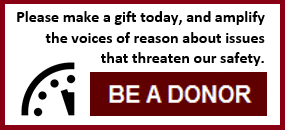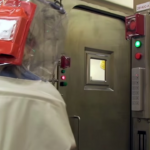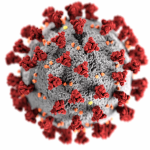What Africa really needs to fight Ebola and other emerging diseases: anti-corruption efforts
By Laura H. Kahn | January 15, 2015

As Ebola’s death toll surpasses 8,000 people, well-intentioned individuals have been suggesting different strategies to contain the crisis. Many of these recommendations have included the use of modern technologies like cell phones, coupled with innovations such as a global rapid response team. But more than anything, what Africa really needs is simply more investment in its people and its basic health care infrastructure, along with reduced corruption—making sure that the money sent to lay the foundations of public health actually goes where it is supposed to.
This is not to say that the wonders of modern technology do not have their place. Some devices, such as cell phones, have proven their worth as tools for disease surveillance and control. In 2008, for example, after a major earthquake in Sichuan province disrupted the electronic disease monitoring system, China’s federal and local health care offices set up an emergency system that used cell phones to report any outbreaks of infectious disease. (Water-borne diseases such as cholera and leptospirosis are a potential byproduct of earthquakes, the result of contaminated drinking water, broken sewage systems, and crowded refugee camps with minimal sanitation, among other factors.) This improvised emergency system allowed health care agencies to rapidly detect and attend to these diseases before they could turn into epidemics in the earthquake-hit region.
But an easily overlooked aspect to this worthy approach is that China already had a well-developed public health infrastructure in place to take advantage of the technology. After all, any cell phone surveillance effort is only as good as the public health infrastructure using it. Such technology-heavy approaches do little good if the underlying public health systems don’t exist. And in contrast, sub-Saharan Africa suffers from a poorly developed infrastructure for public health, so any cell phone-based surveillance efforts there are small-scale and fragmented.
With this in mind, it was short-sighted for Jim Yong Kim, a physician and the president of the World Bank, to recommend that a global health reserve corps be set up to rapidly respond to outbreaks. While such an approach may sound good on paper, in countries such as Guinea, Liberia, and Sierra Leone, there is simply no medical or public health infrastructure to properly identify outbreaks of diseases such as Ebola, which means that the virus can propagate unrecognized for days or even weeks before the crisis is even properly identified. By then, it has spiraled far out of control. And waiting even the littlest bit longer for a global health reserve corps to be mobilized and parachute in would cause even further delays in response—unnecessarily costing additional lives.
A better solution is to invest in putting into place a public health care infrastructure in Africa. Unfortunately, there has been inadequate funding for basic public health in many African countries, as Oyewale Tomori, a veterinary virologist and president of the Nigerian Academy of Science, has observed. And while African scientists have the expertise and the cultural understanding to make them the best resources to refer to in order to solve Africa’s problems, African leaders continue to prefer to seek solutions from outside, Western experts—who all too often appear briefly during crises, make recommendations, then return home. In some cases, Western countries have been known to partially build high-tech laboratories, only to leave them uncompleted and useless—further hindering African scientists’ abilities to put their expertise to good use. It would be much better for African leaders to invest their countries’ money, time, and labor in building their own solid, reliable public health care infrastructures from the ground up in their native lands.
The hidden issue. But arguably, the worst problem that many African countries face is widespread corruption, defined by Transparency International as the abuse of entrusted power for private gain. Corruption can cripple efforts to provide basic health care and save lives, as detailed in a recent New York Times opinion piece that described the devastating effects of corruption on international efforts to contain Ebola.
As corruption goes up, sanitation and health go down, and according to Transparency International, sub-Saharan African countries are among the most corrupt in the world. Not surprisingly, life expectancy declines in such situations, because politicians and civil servants prefer to help themselves rather than the people they are meant to serve.
A case in point is Liberia, which has received billions of dollars in international aid for over a decade, with little to show for it. The country ranks near the bottom of the United Nation’s Human Development Index and near the bottom of Transparency International’s Global Corruption Barometer. And while international aid groups and non-governmental organizations such as Doctors Without Borders and the International Medical Corps provide important humanitarian assistance and medical care, they also inadvertently absolve African political leaders from developing medical and public health infrastructures. In fact, one could argue that such organizations perpetuate dependence, by never forcing African leaders to invest in their people, thus helping corruption continue.
So what can be done? As a starting point, the United Nations General Assembly passed Resolution 58/4, the UN Convention Against Corruption, which went into force on December 14, 2005. If nothing else, it at least identified corruption as a major problem, highlighted it in the public consciousness, and pointed the way towards preventing, criminalizing, and cooperating against corruption.
But to make these goals into a reality requires leadership, disincentives, transparency, and accountability.
Leadership. If the highest-level political leaders are corrupt, then everyone else will be too, down to the lowest traffic cop. (Police are reportedly the most corrupt government officials in Africa.) Instead, political leaders must bear in mind that they are role models and set the standards for how everyone acts. Paying bribes to receive government services should not be tolerated; individuals found to be corrupt should be fired, fined, and imprisoned.
Disincentives. Corruption needs to be criminalized; as long as people get away with this behavior, it will be tolerated and continued. Therefore, political leaders must pass laws implementing strong penalties, such as long prison terms and hefty fines for officials engaged in corruption. The challenge, of course, is to get political leaders to pass anti-corruption laws and accept the consequences if they themselves are found to be corrupt. Western countries could help tremendously by linking the disbursement of international aid to requirements for strict anti-corruption laws and enforcement.
Transparency. Publishing government information such as data on budgets and spending is an important first step in reducing corruption. A free press and engaged citizens are needed to keep watchful eyes on government activities and spending. The legal systems, including judges, need to be free from corruption. Governments must make anti-corruption efforts readily accessible and encourage reporting of officials engaged in taking bribes.
Accountability. External oversight committees that regularly monitor and publicize their findings would help to keep officials accountable to the public. Officials found to be corrupt should be required to return all stolen assets and be severely punished with fines and prison. International cooperation would be essential in returning assets sent abroad.
Countries with high levels of corruption remain heavily dependent on international humanitarian and health care aid, which gives the international community leverage over corrupt regimes. In the long run, international aid and health care merely provides Band-Aids that cover over the underlying problem behind much of human suffering: corruption, which takes away money that would otherwise be used on public health care infrastructure. True aid would focus on this problem and force political leaders to begin investing in their country, their people, and their people’s health—not in themselves.
Together, we make the world safer.
The Bulletin elevates expert voices above the noise. But as an independent nonprofit organization, our operations depend on the support of readers like you. Help us continue to deliver quality journalism that holds leaders accountable. Your support of our work at any level is important. In return, we promise our coverage will be understandable, influential, vigilant, solution-oriented, and fair-minded. Together we can make a difference.
Topics: Biosecurity, Columnists, Special Topics














